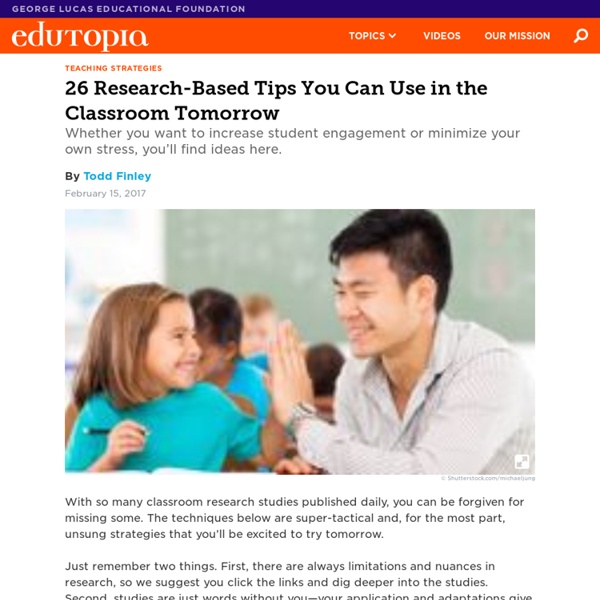12 Curriculum Planning Tips For Any Grade Level Or Content Area
12 Curriculum Planning Tips For Any Grade Level Or Content Area by Terry Heick Roughly put, learning is really just a growth in awareness.
How A Good Teacher Becomes Great
How A Good Teacher Becomes Great by Terry Heick Good teachers are amazing–and rare. The ignorance of the Those who can’t, teach mantra is frightening–being a good teacher is an incredible challenge to achieve consistently. Good teachers use data to drive instruction, know the ins and outs of their curriculum, have refined assessments over and over until they measure depth of content knowledge and not procedural knowledge or some crazy game of remember what the teacher said, or guess what the teacher’s thinking. They support students in self-directed learning, know how technology actually improves learning, and exude a charisma that makes students eager to learn from them.
10 Indicators Of Efficient Teaching
10 Indicators Of Efficient Teaching by TeachThought Staff Notice that we didn’t use the more vague “good teacher” phrasing. That’s an important distinction, because here we’re talking about something a bit more clinical. Not entirely scientific and analytical and icky, but not entirely rhetorical and abstract and mushy either. Something somewhere in the middle–human, efficient, and hopefully happy and sustainable as a result.
20 Signs You’re Actually Making A Difference As A Teacher
Other Data: 20 Signs You’re Actually Making A Difference As A Teacher by Saga Briggs, opencolleges.edu.au You plan. You assess. You network.
22 Powerful Closure Activities
Too many university supervisors and administrators criticize the absence of lesson closure, a dubious assessment practice likely caused by the improper use of Madeline Hunter’s lesson plan model (PDF) as a de facto checklist of eight mandatory teaching practices -- anticipatory set, objective and purpose, input, modeling, checking for understanding, guided practice, independent practice, and closure -- a custom that Hunter decried in 1985 (PDF). Although it offers multiple benefits, please don't view closure as a professional must-do. What Is Closure?
15 creative & respectful ways to quiet a class -
Have you fallen into the trap of saying “No talking!” or “I need quiet!” all day long? It’s exhausting to keep repeating your requests for silence, and after the hundredth time, kids just tune you out, anyway. There have been some great discussions about how to get students to quiet down on my Facebook page, and I want to share what’s worked for those teachers as well as what I’ve tried in my own classroom.
6 Ways to Become a 21st Century Teacher Infographic
Teacher Infographics 6 Ways to Become a 21st Century Teacher Infographic 6 Ways to Become a 21st Century Teacher Infographic If you have ever wondered what it takes to be a successful 21st century teacher, you might have come to realize that it is easier said than done.
Teaching In 2017: A Checklist For 21st Century Teachers -
Teaching In 2017: A Checklist For 21st Century Teachers by TeachThought Staff What are the kind of things a 21st century teacher needs to know and be able to do? What about 21st century students? What education technology works, and what is a waste of time?
4 Student Engagement Tips (From a Student)
I just graduated from Nashville Big Picture High School, and this is where I'm at in my life: I made a 20-minute documentary about my graduating class of 2016.I am getting paid to go to different places throughout Tennessee this summer to make videos explaining the products and services of various companies.I have a possible video job lined up when I enter college.I recently made a video for Edutopia. (It's not every day that an educational foundation run by George Lucas asks you to make a video for them -- especially at the age of 17!) I've been able to accomplish all of this because my school gave me the freedom to make my own choices. I chose where I interned, whether or not I took college classes and earned college credit, and most importantly, I always had a choice in every class project.
edutopia
Quin: My name is Quin and I live on the central coast of California. I really like to do embedded electronics, soldering, hacking, 3-D printing and laser-cutting. It’s really cool seeing your project come to life. I used to do a lot of LEGO stuff, like taking things apart, and a computer is something that you can easily take apart and sometimes not as easily put it back together.
The 10 Skills Modern Teachers Must Have
There’s been a lot of talk recently about what it means to be a learner in the 21st Century. Earlier this year, we put together a guide with skills important for students today. So, why not a list for educators, too? The list goes beyond technology and social media. Check out what skill we think makes a modern teacher, and let us know your thoughts on the matter in the comments below.
10 Reasons Every Teacher Needs A Professional Learning Network -
10 Reasons Every Teacher Needs A Professional Learning Network by TeachThought Staff What’s a professional learning network? According to Marc-André Lalande, “a Personal Learning Network is a way of describing the group of people that you connect with to learn their ideas, their questions, their reflections, and their references. Your PLN is not limited to online interactions, but it is that online, global interactive part that really makes it special.



